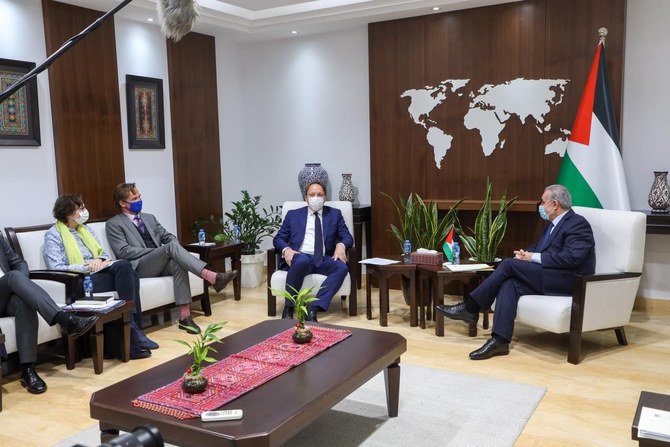A senior EU official has reaffirmed Europe’s commitment to Palestinians following a partial suspension of its support last year.
The comments were made by Oliver Varhelyi, EU commissioner for neighborhood and enlargement, during a meeting with senior Palestinian officials in Ramallah on Thursday.
The two sides also discussed the implementation of the new EU Agenda for the Mediterranean and its accompanying economic and investment plan.
Varhelyi alsomet Palestinian Prime Minister Mohammed Shtayyieh and representatives of the Christian community in East Jerusalem.
“Europe has been and remains a partner and friend of the Palestinian people and an essential supporter for decades,” Shtayyieh said.
He stressed the importance of European financial support at a time when Palestine is being affected by global changes and their impact on prices, and “the unjust Israeli cuts from our funds”.
EU support for Palestine was partially suspended in 2021, causing significant damage to several groups, most notably those dependent on the social welfare system.
Shtayyeh said the delays to European budget support “reflected negatively on our ability to fulfill obligations toward groups that receive social support and employee salaries, and the work of institutions.”
But, he added: “We refuse to place conditions on European aid and we want to maintain a true partnership based on respect and cooperation, not conditions.”
Shtayyeh briefed Varhelyi on the latest political developments and the moves by Israel, including settlement expansion and land seizures, that were preventing the creation of a Palestinian state.
He stressed the need to create a political path to save the two-state solution, end the occupation and establish an independent Palestine.
Varhelyi also visited the Qalandiya refugee camp and the Technical Vocational Education and Training Center, where he met Leni Stenseth, deputy commissioner of the UN Relief and Works Agency.
Varhelyisaid the visit was an opportunity to discuss ways to move forward on major EU projects such as the Gaza central desalination plant and gas distribution for the enclave.
The EU, he said, would remain an “essential and steadfast supporter” of Palestinians with financial support directed at establishing accountable institutions for a future Palestinian state and supporting the emergence of an economy based on self-sufficiency.
He said the bloc would remain committed to a just and comprehensive solution to the Israeli-Palestinian conflict, based on the two-state solution.
The EU delegation also visited Augusta Victoria Hospital and met representatives of East Jerusalem hospitals.
The delegates were briefed on the financial difficulties and challenges facing hospitals due to the accumulation of unpaid health transfer bills issued by the Palestinian Authority.
Representatives of Augusta Victoria Hospital said the facility was facing a cash crisis that affected its ability to provide cancer treatment, posing a threat to the lives of its patients.
Since September, the hospital has had to reject more than 400 newly diagnosed cancer patients, and about 580 cancer patients are at risk of having their treatment interrupted. The hospital has requested urgent grants from donors to help alleviate the situation.
Munib Younan, a former chairman of the hospital’s board of trustees, told Arab News: “We deeply appreciate the EU support for Augusta Victoria … which provides medical services for hundreds of cancer and kidney failure patients from the West Bank, Gaza Strip and East Jerusalem.”
Gerhard Krause, EU head of cooperation, said the bloc remained committed to assisting the PA in supporting East Jerusalem hospitals and would continue providing financial support to help it cover the cost of referrals.
This, he added, would help to maintain the availability and accessibility of essential health care services for Palestinians all over the occupied territory.
“We are aware of East Jerusalem hospitals’ complex financial crisis,” Krause said. “We urge the PA to provide a sufficient and regular amount of advances to hospitals to avoid serious cash flow problems and interruption in providing essential medical treatments and services.”
At the same time, East Jerusalem hospitals “must implement the necessary reforms to improve the financial sustainability of hospitals and maintain the quality of health care services,” he added.
The EU contributes almost $14.3 million a year to hospitals in East Jerusalem. Since 2012, the bloc and member states Italy and Finland have paid more than $153.7 million to partially cover the cost of health referrals issued by the PA to hospitals.
East Jerusalem hospitals are an integral part of the Palestinian health care system, providing technical services that cannot be found anywhere else in the West Bank and Gaza Strip.
Patients who need medical services that are not available in the W

